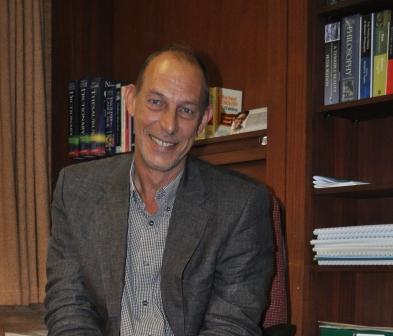
Professor Dirk Klopper, HOD for English, is very considered in his response to the question: “Why the focus on South African literature?” In his opinion, the time is ripe to revisit South African and African literature in a way that differs from the 70s and 80s, when it was done to combat alienation from students’ local context (the ‘take root or die” argument) or was much politicised because it was part of the struggle. He feels that today, this study is tied up with making sense of what it means to be a South African in a rapidly urbanising and cosmopolitan culture, 16 years into democracy.
Prof Klopper believes the Department has a responsibility to find a different paradigm by which to analyse South African literature – to read the literature in a more complex and sophisticated way and draw what is of value from writers that were unfairly dismissed because of unpopular ideological positions. This is also a challenge, because many academics specialising in Southern African literature left the country in the 70’s and 80s and set up programmes at overseas universities that are now drawing some of South Africa’s best post-graduate students. “There are strong academics in the international scholarly community that are driving the agenda and compelling us to up our game,” he says.
If it is relevant, literature speaks to our lives in a way that other disciplines don’t, and Prof Klopper believes that this will attract students into post-graduate studies such as this English Honours course. “In South Africa, we live at the interface of different languages and cultures, and we need to develop students that can occupy and write about these spaces from within rather than from a distance.” He says they hope to attract more Black students into post-graduate studies and also more teachers.
According to Prof Klopper there is a lot of literature emerging that reflects a new way of being South African, e.g. the urban experience, being part of a cosmopolitan post-apartheid city and part of a materialistic society dealing with the issues of AIDS, violence and gender. This includes a genre of “chick lit” that is being written by young black women about the pressures they face in balancing traditional values and norms with a new metropolitan landscape.
The English Department at Rhodes boasts a legacy of South Africanists with high standing, such as Guy Butler, and Prof Klopper says they are trying to revive that and build on it. He points out that Grahamstown and Rhodes is home to the National English Literary Museum (NELM), the Institute for the Study of English in Africa (ISEA), the English in Africa journal and the Dictionary Unit. “There’s a lot to work with here.”
There are exciting possibilities for students on the new English Honours course and beyond. It will enrich those planning on a career in teaching as well as those who want to do the MA in Creative Writing, as it will equip them with good knowledge of South African literature and inform them of the strategies used by other writers. In order to work across language and cultural divides, the possibility is being explored of students doing a Paper in African Literature in the African Languages Department or the Afrikaans Department.
The curriculum for the Honours course will consist of four sections, i.e. Landmarks of South African fiction (e.g. Story of an African Farm by Olive Schreiner); Countryside and City (divided into two parts that look at the historical, pastoral tradition and the more contemporary, urban writing respectively); Special Authors (Coetzee, Vladislavic, Mda and Wicomb); and Ecology and Orality. For the latter, students will engage analytically with works such as Gem Squash Tokoloshe, the story of a five-year old girl trying to marry the thoughts about the spirit world she has received from her nanny and the ideas about fairies from her mother, as well as a collection of praise poems.
The response to the advertisement for the new English Honours course has been good, but many of the applicants are in full-time employment. This means that the delivery mode of the course may need to be adapted to a more Open University-type model with good reading packs and occasional Winter School, etc. rather than weekly seminars.
Picture: Professor Dirk Klopper, HOD for English.
